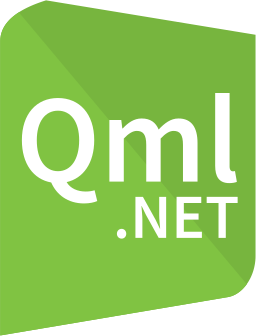A Qt/Qml integration with .NET
Supported platforms/runtimes:
- Runtimes:
- .NET Framework
- .NET Core
- Mono
- Operating systems
- Linux
- OSX
- Windows
- Proven in production.
- Established GUI/control framework, used in many industries, from desktop to embedded.
- Excellent community with many open-sourced controls available.
- Native rendering, done in native code. No expensive PInvoke calls for rendering/animations/etc. The only interop between .NET and Qt is the data models used to drive the GUI.
WIP: https://qmlnet.github.io/
dotnet add package Qml.Net
dotnet add package Qml.Net.WindowsBinaries
dotnet add package Qml.Net.OSXBinaries
dotnet add package Qml.Net.LinuxBinariesNote for Linux users: Package libc6-dev is required to be installed because it contains libdl.so that is needed.
Checkout the examples on how to do many things with Qml.Net.
Define a .NET type (POCO)
//QmlType.cs
using Qml.Net;
using System.Threading.Tasks;
namespace QmlQuickOverview
{
[Signal("customSignal", NetVariantType.String)] // You can define signals that Qml can listen to.
public class QmlType
{
/// <summary>
/// Properties are exposed to Qml.
/// </summary>
[NotifySignal("stringPropertyChanged")] // For Qml binding/MVVM.
public string StringProperty { get; set; }
/// <summary>
/// Methods can return .NET types.
/// The returned type can be invoked from Qml (properties/methods/events/etc).
/// </summary>
/// <returns></returns>
public QmlType CreateNetObject()
{
return new QmlType();
}
/// <summary>
/// Qml can pass .NET types to .NET methods.
/// </summary>
/// <param name="parameter"></param>
public void TestMethod(QmlType parameter)
{
}
/// <summary>
/// Async methods can be invoked with continuations happening on Qt's main thread.
/// </summary>
public async Task<string> TestAsync()
{
// On the UI thread
await Task.Run(() =>
{
// On the background thread
});
// On the UI thread
return "async result!";
}
/// <summary>
/// Qml can also pass Qml/C++ objects that can be invoked from .NET
/// </summary>
/// <param name="qObject"></param>
public void TestMethodWithQObject(dynamic o)
{
string result = o.propertyDefinedInCpp;
o.methodDefinedInCpp(result);
// You can also listen to signals on QObjects.
var qObject = o as INetQObject;
var handler = qObject.AttachSignal("signalName", parameters => {
// parameters is a list of arguements passed to the signal.
});
handler.Dispose(); // When you are done listening to signal.
// You can also listen to when a property changes (notify signal).
handler = qObject.AttachNotifySignal("property", parameters => {
// parameters is a list of arguements passed to the signal.
});
handler.Dispose(); // When you are done listening to signal.
}
/// <summary>
/// .NET can activate signals to send notifications to Qml.
/// </summary>
public void ActivateCustomSignal(string message)
{
this.ActivateSignal("customSignal", message);
}
}
}Register your new type with Qml.
//QmlExample.cs
using Qml.Net;
using Qml.Net.Runtimes;
namespace QmlQuickOverview
{
class QmlExample
{
static int Main(string[] args)
{
RuntimeManager.DiscoverOrDownloadSuitableQtRuntime();
using (var app = new QGuiApplication(args))
{
using (var engine = new QQmlApplicationEngine())
{
// Register our new type to be used in Qml
Qml.Net.Qml.RegisterType<QmlType>("test", 1, 1);
engine.Load("Main.qml");
return app.Exec();
}
}
}
}
}Use the .NET type in Qml
//Main.qml
import QtQuick 2.7
import QtQuick.Controls 2.0
import QtQuick.Layouts 1.0
import test 1.1
ApplicationWindow {
visible: true
width: 640
height: 480
title: qsTr("Hello World")
QmlType {
id: test
Component.onCompleted: function() {
// We can read/set properties
console.log(test.stringProperty)
test.stringPropertyChanged.connect(function() {
console.log("The property was changed!")
})
test.stringProperty = "New value!"
// We can return .NET types (even ones not registered with Qml)
var netObject = test.createNetObject();
// All properties/methods/signals can be invoked on "netObject"
// We can also pass the .NET object back to .NET
netObject.testMethod(netObject)
// We can invoke async tasks that have continuation on the UI thread
var task = netObject.testAsync()
// And we can await the task
Net.await(task, function(result) {
// With the result!
console.log(result)
})
// We can trigger signals from .NET
test.customSignal.connect(function(message) {
console.log("message: " + message)
})
test.activateCustomSignal("test message!")
}
function testHandler(message) {
console.log("Message - " + message)
}
}
}- Support for all the basic Qml types and the back-and-forth between them (
DateTime,string, etc). - Reading/setting properties on .NET objects.
- Invoking methods on .NET obejcts.
- Declaring and activating signals on .NET objects.
-
asyncandawaitwith support for awaiting and getting the result from Qml. - Passing dynamic javascript objects to .NET as
dynamic. - Custom V8 type that looks like an array, but wraps a .NET
IList<T>instance, for modification of list in Qml, and performance. - Dynamically compiled delegates for increased performance.
- Passing
QObjecttypes to .NET with support for interacting with signals/slots/properties on them.
There aren't really any important features missing that are needed for prime-time. This product is currently used on embedded devices in the medical industry.
The unit tests can be found in src/native/Qml.Net.Tests.
They can be run directly from Visual Studio, or by using the dotnet test command line tool.
Since the tests rely on the native QmlNet library, you have to ensure the library is in the PATH (on Windows) or otherwise discoverable. If you are trying to run tests against the native library built from the same repository, you can put the src/native/output folder into your PATH or LD_LIBRARY_PATH after running the build.bat or build.sh script.
Thanks goes to these wonderful people!
Michael Lamers 💻 |
TripleWhy 💻 |
Max 💻 📖 💵 |
geigertom 💻 |
James Davila 💻 |
Andy Fillebrown 💻 |
Vadim Peretokin 📖 |
Linus Juhlin 📖 |





